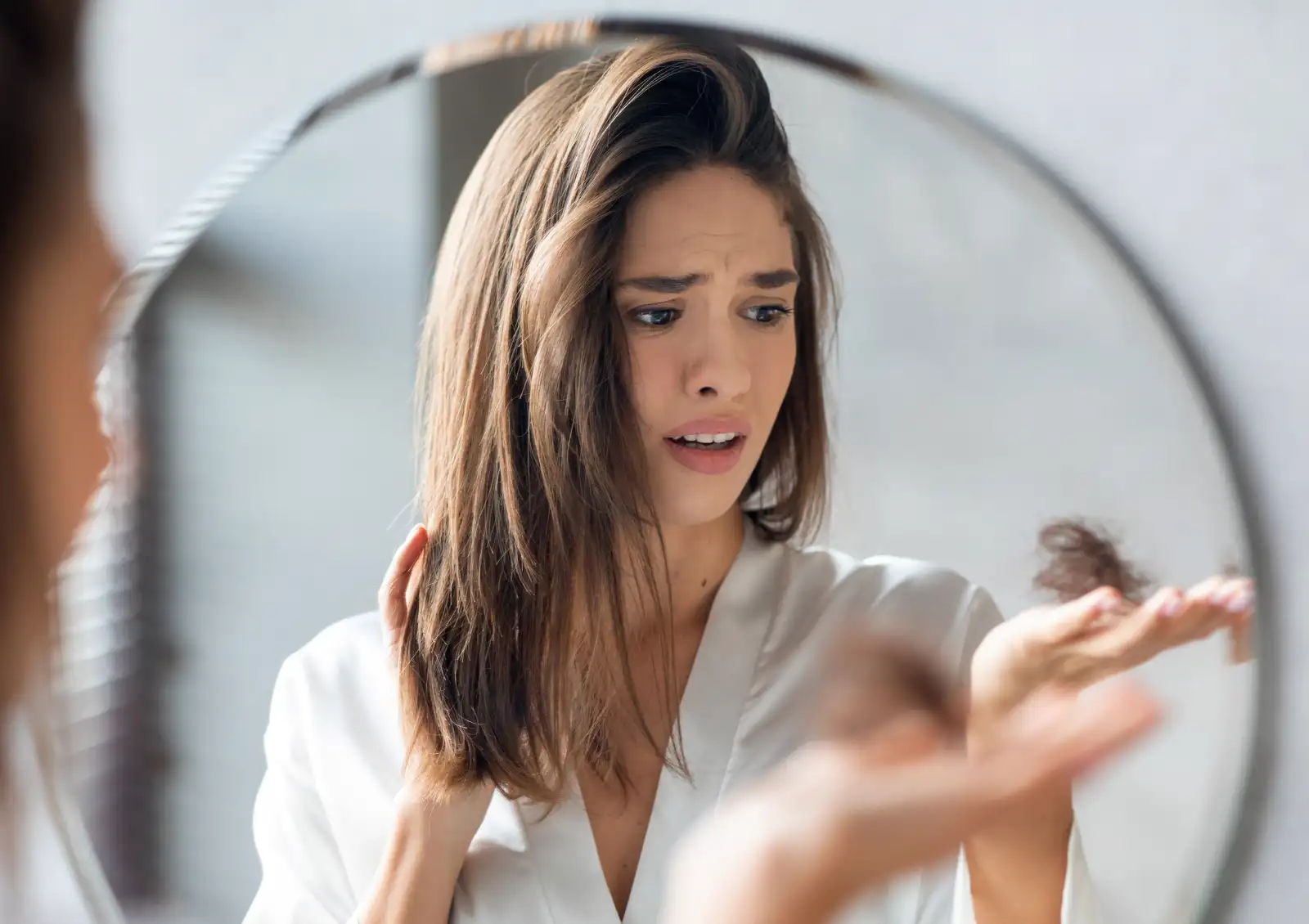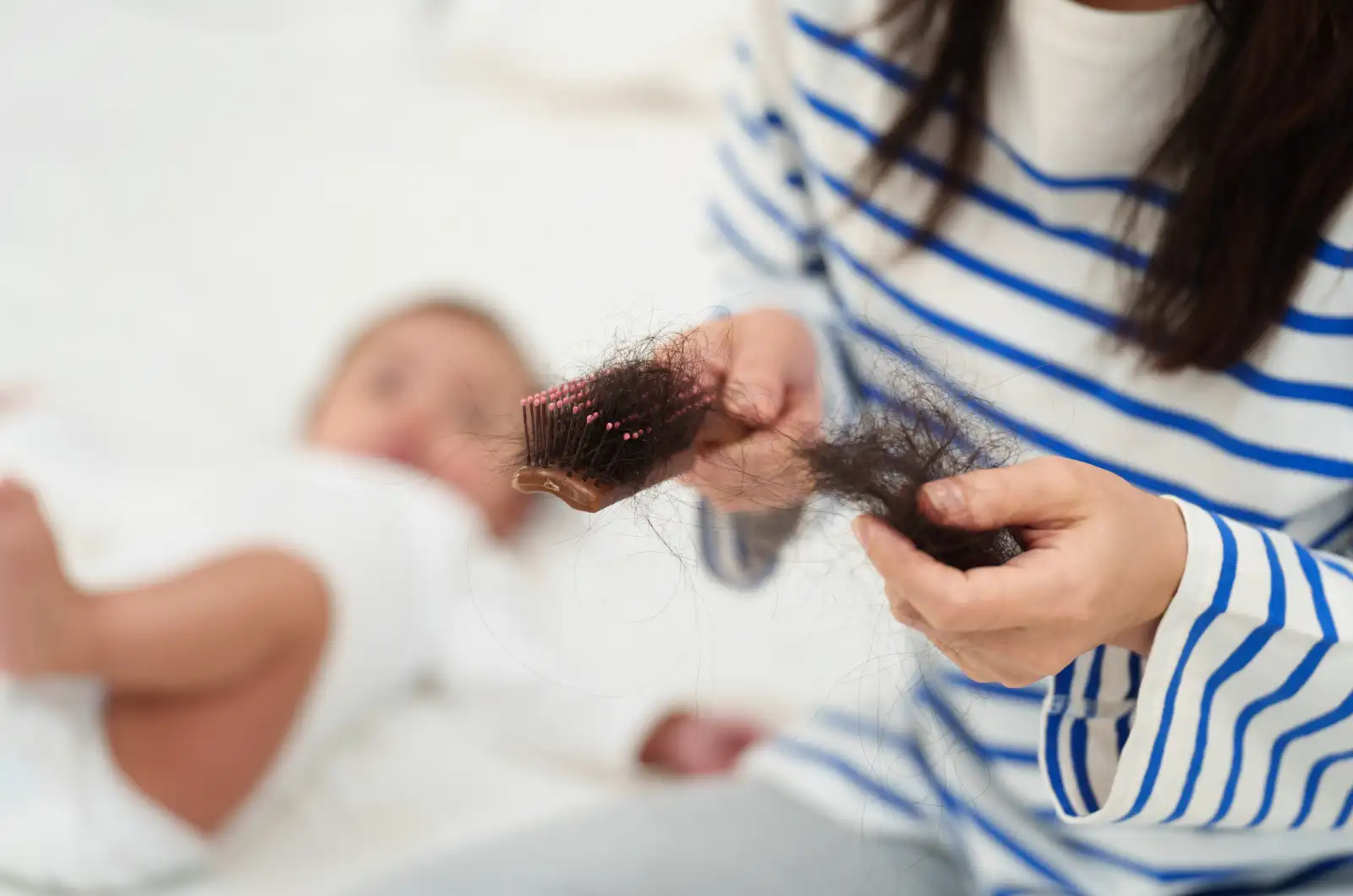Stress has become an inseparable part of modern life. Work challenges, studies, personal worries and emotional overload do not only affect mental well-being, but also physical health. One of the most noticeable reactions of the body to stress is hair loss. Why does this happen, how are hormonal mechanisms involved, and what to do if your hair starts thinning due to stress? Let’s explore this topic in detail.

How Stress Affects Hair Growth
During stress, the hypothalamic-pituitary-adrenal system becomes activated, triggering the release of stress hormones such as cortisol, adrenaline and prolactin. These hormones help us cope with emotional or physical pressure, but when they remain elevated for a long period, they can cause damage.
Under the influence of cortisol, blood vessels in the scalp constrict, disrupting blood flow to the hair follicles. As a result, the follicles receive less oxygen and nutrients, which interferes with the natural hair growth cycle. Hair follicles prematurely enter the resting phase (telogen), which leads to active hair shedding.
Additionally, stress disrupts sebaceous gland activity, causing either excessive oiliness or extreme dryness of the scalp. This affects hair quality, making it brittle, dull and less elastic.
The stem cell zone of the hair follicle, where a new hair forms, is particularly sensitive to stress. When it is affected, the growth of new hair temporarily stops. At the same time, nerve endings in the scalp release substances that cause itching, tingling and burning sensations. This may worsen conditions such as seborrheic dermatitis or psoriasis.
Acute vs. Chronic Stress
Acute Stress
A sudden, intense emotional shock - such as an accident, loss, fear or job termination - triggers an immediate hormonal reaction. Adrenaline and cortisol levels spike sharply, and the tiny muscle attached to each follicle contracts, compressing the follicular structure and damaging the hair root. This may result in a sudden yet temporary episode of hair loss.
Chronic Stress
When stress becomes long-term, the body can no longer compensate. Hormonal, immune and digestive processes begin to malfunction. Nutrient absorption worsens and the follicles suffer from a lack of nourishment. Hair becomes thinner, weaker and begins to fall out. This condition may lead to reactive telogen effluvium, which can progress into chronic diffuse alopecia.
Chronic stress may also trigger or worsen other scalp conditions such as alopecia areata, folliculitis, seborrheic dermatitis, psoriasis and, in rare cases, scarring alopecia.
How to Recognize Stress-Induced Hair Loss
It is normal to lose up to 100 hairs per day. However, if you notice significantly more hair on your pillow, brush or in the shower, it is worth paying attention.
A simple check at home: gently pull a strand of 20–30 hairs. If more than six hairs remain in your hand, there may be an issue. Although this test is not perfectly accurate, it can be an early signal. In case of doubt, it is best to consult a trichologist.
How to Treat Hair Loss Caused by Stress

Stress-related hair loss requires a comprehensive approach because it affects both the hair follicles and the entire body. The main goal is to stabilise the nervous system, improve scalp blood circulation and stimulate new hair growth. Treatment typically includes several key directions.
Medicated Treatment
Topical products that stimulate hair growth and regulate sebaceous gland activity are commonly used. These include lotions, serums, medical shampoos and solutions with active ingredients aimed at improving microcirculation, strengthening follicles and balancing scalp oil production. All products should be selected individually by a specialist and used only under medical guidance to ensure safety and efficacy.
Injection Therapies
Mesotherapy, ozone therapy and PRP therapy (platelet-rich plasma) are often recommended. These procedures deliver vitamins, amino acids, trace elements and regenerative components directly into the scalp near the follicles. This improves local nutrition, stimulates cellular renewal and activates new hair growth while reducing shedding. Additionally, these methods boost blood circulation, enhance metabolic processes and strengthen the scalp’s protective functions, creating optimal conditions for hair recovery.
Physiotherapy
Low-level laser therapy and microcurrent therapy enhance circulation and metabolic processes within the scalp. They help awaken inactive follicles, speed up hair growth and make existing hair stronger and denser. At the same time, they reduce inflammation, normalise sebum production and improve skin tone.
Care Procedures
Regular scalp exfoliation is essential to remove dead skin cells, excess oil and product buildup. This improves microcirculation, enhances oxygen delivery and increases the effectiveness of treatment products. Over time, the scalp becomes healthier and hair receives better growth conditions.
Vitamins and Minerals
Particularly important are Vitamins from the D-, B-complex group, zinc, iron, magnesium and biotin play a crucial role. Stress often depletes these nutrients, leading to weakened hair, slower growth and shedding. They support cellular metabolism, strengthen follicles, improve circulation and encourage keratin synthesis - the primary protein that forms hair. Supplements should be taken under medical supervision.
A full treatment cycle often lasts four to six months, followed by maintenance therapy and regular follow-up appointments.
How to Support Your Hair and Yourself
Consult a Specialist
If you are experiencing significant hair loss, a trichologist should be your first point of contact. Sometimes stress is not the only trigger - thyroid issues, digestive disturbances or immune disorders may contribute. Therefore, consultations with an endocrinologist and gastroenterologist may be necessary.
Reduce Stress Factors
Identify the trigger and work on minimising it. Complete elimination of stress is impossible, but you can control how your body reacts. Meditation, breathing exercises, sharing responsibilities, proper rest, spending time with loved ones and pursuing hobbies help reduce emotional tension and support scalp and hair health.
Improve Lifestyle Habits
Chronic fatigue, lack of sleep, irregular eating patterns and harmful habits directly affect hair condition. Ensure sufficient rest, sleep at least 7–8 hours, eat a nutrient-rich diet with vegetables, protein, nuts and fish, maintain proper hydration and spend time outdoors. Moderate physical activity supports blood flow and improves overall well-being, benefiting hair health.
The condition of the hair, skin and nails reflects internal health. If hair becomes thinner, dull or begins to shed, it is a signal to pay attention not only to cosmetic care, but also to emotional wellness.
Conclusion
Stress-induced hair loss is common but reversible. It occurs due to hormonal changes and reduced follicle nourishment triggered by emotional strain. With timely professional help, a comprehensive treatment plan and lifestyle adjustments, hair gradually recovers. It is important not only to treat the symptoms, but also to address the root cause - chronic stress. Supporting mental health, ensuring proper rest, balanced nutrition and practicing self-care will help restore hair density and improve overall well-being.


